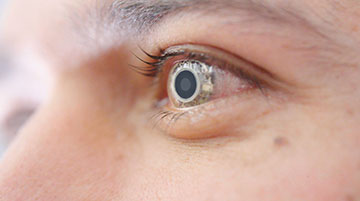
Azalea’s smart lens on the eye of Andrés Vásquez Quintero, Azalea cofounder and CTO. [Image: Azalea Vision]
Health technology company Azalea Vision, Belgium, announced that it had raised €9 million (US$10.3 million) as part of its series A funding round. On completion of the round, the company hopes to raise a total of €15 million (US$16.7 million) toward clinical trials of its smart lens technology, designed to correct vision impairment in fluctuating eye conditions. In the same announcement, Azalea reported the appointment of Robert J. Dempsey as chairman of the board, with the goal of promoting strategic growth in the US and European markets.
“I believe a future where vision is intelligent, connected and effortlessly adaptive is among the most exciting frontiers in eyecare medical device innovation today,” said Dempsey in a press release.
A smart contact lens
The startup spun out from imec and Ghent University, both based in Belgium, in 2021 to develop medical-grade smart contact lenses that the company says can mimic the responsiveness of the human eye. Dubbed the ALMA (active light management) lens, the proprietary technology consists of a contact lens embedded with an artificial iris that is based on the team’s previous work developing a so-called guest-host liquid crystal (GH-LCD). The GH-LCD is made up of liquid crystal, chiral dopant and dichroic dye and is able to change the transmittance of the contact lens, enabling real-time light adaptation and greater depth-of-focus capabilities.
The new investment comes on the heels of Azalea’s first human test—the subject of which was Azalea cofounder and CTO Andrés Vásquez Quintero—of the lens, which is intended as an alternative to surgery for conditions like presbyopia, keratoconus and photophobia.
According to the company, the lens will be custom made and fit for each patient, and it integrates adaptive optics, a smart microchip and microbattery, and the GH-LCD technology to achieve its responsive light-filtering capabilities.
According to the company, the lens will be custom made and fit for each patient, and it integrates adaptive optics, a smart microchip and microbattery, and the GH-LCD technology to achieve its responsive light-filtering capabilities. The lens also has embedded sensors and near-field communication antennas to communicate with smartphones and watches, enabling users and doctors to control lens modes and configure personalized therapy.
Funding and the future
The new round of funding was supported by Azalea’s existing investors SPRIM Global Investments and venture capital fund Afrimobility, as well as an undisclosed investor. “Strong participation from repeat investors in this series A milestone reaffirms their trust in our medical device and innovation for the future of intelligent ocular health,” said Enrique Vega, Azalea’s cofounder and CEO.
The funding will support pilot clinical trials for the technology. The company said, “the goal is to receive Investigational Device Exemption approval from the US Food and Drug Administration, continue the clinical trials and further advance commercialization efforts.”
The company also was awarded the European Innovation Council grant, worth €2.5 million (US$2.8 million) in March 2024. “This funding will significantly boost our journey toward providing smart lenses as a medical device for multiple large patient groups.” said Vega

